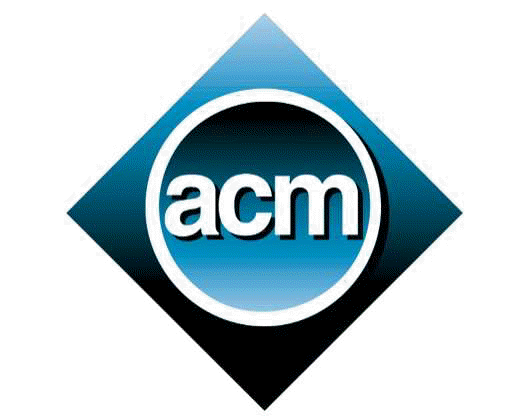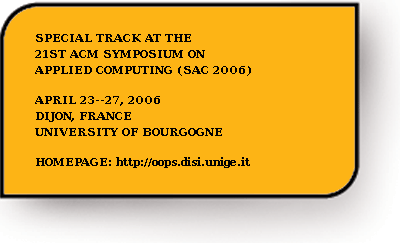|
List of accepted papers
SAC 2006
For the past twenty years, the ACM Symposium on Applied Computing (SAC) has
been a primary gathering forum for applied computer scientists,
computer engineers, software engineers, and application developers
from around the world.
SAC 2006 is sponsored by the ACM Special
Interest Group on Applied Computing, will be held 23-27 April 2006, and is hosted by the University
of Bourgogne, Dijon, France.
OOPS TRACK: AIMS AND
TOPICS
Today's large scale software systems are typically designed and
implemented using the concepts of the object-oriented (OO) paradigm.
However, there is still a need for existing OO languages and
architectures to continuously adapt in response to demands for
new features and innovative approaches.
These new features, to name a few, include unanticipated software evolution,
security, safety, distribution, and interoperability.
The basic aim of the OOPS track at the SAC 2006 is to promote and
stimulate further research on the object-oriented programming and
distributed-object paradigms.
This track will foster the development of extensions and
enhancements to the prevalent OO languages, such as Java, C# and
C++, the formulation of innovative OO-based middleware
approaches, and the improvements to existing and well-established
distributed-object based systems.
Specifically, this track will invite papers investigating the
applicability of new ideas to widespread, and standard
object-oriented languages and distributed-object architectures.
A medium to long-term vision is also solicited, tackling general issues about
the current and future role of prevalent OO languages and distributed
architectures in Computer Science and Engineering.
Particularly of interest for this track are those papers that provide a thorough
analysis covering following aspects: theory, design,
implementation, applicability, performance evaluation, and
comparison/integration with existing constructs and mechanisms.
Original papers and implementation reports are invited from all areas of OO
programming languages and distributed-object computing.
The specific topics of interest for the OOPS track include, but are not limited to, the following:
> Programming abstractions
> Advanced type
mechanisms and type safety
> Multi-paradigm features
>
Language features in support of open systems
> Aspect-oriented and
component-based programming
> Reflection, meta-programming
>
Program structuring, modularity, generative
programming
> Compositional languages
> Distributed objects
and concurrency
> Middleware
> Heterogeneity and
interoperability
> Applications of distributed object
computing

|
|
TRACK
CHAIRMEN
> Davide
Ancona
DISI, UniversitÓ di Genova,
Italy
davide@disi.unige.it
> Mirko
Viroli
DEIS UniversitÓ di Bologna,
Italy
mviroli@deis.unibo.it
PROGRAM
COMMITTEE
> Umesh Bellur, Indian Institute of Technology Bombay, India
> Andrew Black, Portland State University, USA
> John Boyland, University of Wisconsin-Milwaukee, USA
> Yoonsik Cheon, University of Texas at El Paso, USA
> Alessandro Coglio, Kestrel Institute, USA
> Pierre Cointe, Ecole des Mines de Nantes, France
> Pascal Costanza, Vrije Universiteit Brussel, Belgium
> Ferruccio Damiani, UniversitÓ di Torino, Italy
> Erik Ernst, DAIMI, Denmark
> Geoffrey Fox, Indiana University, USA
> Jeffrey Gray, University of Alabama at Birmingham, USA
> Michael Hicks, University of Maryland, USA
> Atsushi Igarashi, Kyoto University, Japan
> Raymond Klefstad, University of California at Irvine, USA
> Doug Lea, Suny Oswego, USA
> Giovanni Lagorio, UniversitÓ di Genova, Italy
> Francesco Logozzo, ╔cole Polytechnique, France
> Giovanni Rimassa, Whitestein Technologies, Switzerland
> Vladimiro Sassone, University of Sussex, UK
> Yannis Smaragdakis, Georgia Institute of Technology, USA
> Don Syme, Microsoft Research, UK
> Bedir Tekinerdogan, University of Twente, The Netherlands
> Matthias Zenger, Google, Switzerland
SUBMISSION INSTRUCTIONS
Papers can only be submitted electronically at the following
page
Please, contact Jeff Allen (jallen@C.iupui.E where C=cs, E=edu) for any problems with the system.
The author(s) name(s) and address(es) must not appear in
the body of the paper, and self-reference should be in the third person.
This is to facilitate a blind review process.
The preferred format
for the submission is the ACM SIG Proceedings Template (available through
http://www.acm.org/sigs/pubs/proceed/template.html).
The body of the paper should not exceed 4,000 words (5 pages
according to the above style).
All papers must be submitted by September 3,
2005.
Submission of the same paper to multiple tracks is
not allowed.
PROCEEDINGS AND SPECIAL ISSUE
Papers
accepted for the OOPS track will be published by ACM both in the SAC 2006
proceedings and in the Digital Library, with the option
(at additional expense) to add 3 more pages.
A set of selected papers, which
did not get accepted as full papers, will be accepted as poster papers and
will be published as extended 2-page abstracts in the symposium
proceedings.
Please note that full registration is required for paper and poster inclusion in the conference proceedings and CD.
Student registration does not cover paper and poster
inclusion in the conference proceedings, but it is only intended to encourage student attendance.
Finally, a number of OOPS 2004 full papers
was selected for an extended version published on a special issue of
the Journal of Object Technology. We are currently setting up a special issue including
extended versions of papers accepted at OOPS 2005,
and we are planning to continue this tradition for OOPS 2006.
IMPORTANT DATES
September 3, 2005: Paper Submission
October
15, 2005: Author Notification
November 5, 2005: Camera-Ready
Copy
April 23--27, 2006: SAC 2006
|


